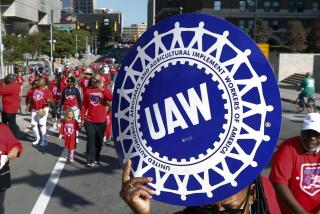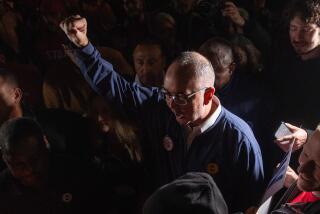Canadian Auto Workers Form Separate Union
- Share via
TORONTO — Canada’s breakaway auto workers formally established their own union Friday and elected Robert White, the man who led them to independence, as the first president.
The United Auto Workers of Canada, wrapping up their founding convention a day early, also adopted a policy statement calling for close fraternal ties with the Detroit-based United Auto Workers, the union they are leaving after 50 years.
“We did not take this action because we are narrow nationalists unconcerned about workers in the rest of the world,” the 338 delegates said in a statement adopted without dissent. “Quite the opposite. We made this decision because we believe profoundly in the importance of international ties and in the national autonomy and national expression necessary for strengthening those ties.”
White, 50, whose only declared opponent for the presidency failed to find a delegate willing to nominate him, has been director for Canada and vice president of the international UAW.
After adjourning the convention Friday afternoon, White said he believed that the convention established a sound foundation for the 135,000-member union.
“I think everybody feels good about the union,” White said. “We’re realistic enough to know tomorrow morning we’re not going to change the world.”
In fact, the union will continue to operate under the international constitution until May, 1986, when a UAW convention in Anaheim will be asked to ratify the split.
Money set aside for the Canadian union--most of it to be for the strike fund--also remains under the control of union officials in Detroit, although White said he was hopeful that the financial transfer could be arranged in the next few weeks.
A 120-page constitution for the new union was adopted Friday without substantive amendments, taking far less time than had been set aside.
Debate Went ‘Smoothly’
“The debate went along very smoothly,” said Wendy Cuthbertson, a union spokeswoman. “We were able to complete our work before our predictions.”
Besides White, four other officers--a secretary-treasurer, Quebec director and two national trustees--were elected without opposition.
Tensions within the UAW escalated beginning in the late 1970s and broke into the open when Canadian workers went on strike at Chrysler in 1982 and General Motors in 1984, both times against the wishes of the union leadership in Detroit.
White later said he came under intense pressure from UAW President Owen Bieber not to reach settlements substantially different from the pattern set in the United States.
Agreed to Split
“I told . . . Bieber that I do not intend ever to go through this experience again, where a collective bargaining objective or settlement cannot be achieved because of how it is viewed in the United States,” White told fellow union members last December. “If the situation was reversed, there would be a revolution in our union in the U.S.”
The UAW’s executive board rejected White’s proposal for greater Canadian autonomy by a 24-1 vote, then agreed to an amicable split. The break reduces the Detroit-based union’s membership from 1.1 million to 965,000.






